| TICUA Hall of Fame Class of 2022 |
|
Close
 Dr. Robert BowersInducting Institution: Southern Adventist University Southern Adventist University - B.S., Biology | 1957
At the age of six, Dr. Robert Bowers watched a physician attend to his father who had contracted tuberculosis. Dr. Bowers’ wonder and fascination grew as the doctor took a chest X-ray and explained the findings. Admiration for the twofold ability to understand problems others couldn’t see and to take action to fix them eventually became a calling into medicine for Dr. Bowers. An exemplary model in upholding the values of Southern Adventist University, Dr. Bowers specifically has embodied his alma mater’s commitment to serve others generously during his lifetime of significant medical achievements. In 1995, the university presented him with the Alumnus of the Year Award. After years working as a family physician and later as an ear, nose, and throat specialist, he freely gives his time as medical director for Volunteers in Medicine Chattanooga (VIM). The faith-based nonprofit provides primary care to people in the region without access to health insurance — nearly 16%, per the Centers for Disease Control and Prevention. Dr. Bowers also was founder and past president of the Medical Foundation of Chattanooga, where he helped start Project Access to connect those who are uninsured with specialty care. Since VIM’s origins in 2004, the clinic has operated on private donations and the work of a dozen or so volunteer physicians, including Dr. Bowers, who has been involved from the start. VIM logs 5,000 patient visits each year, all of whom are not insured by employers but also don’t qualify for Medicaid or governmentissued subsidies. Dr. Bowers describes them as “wonderful people who just fell on hard times … but we can help them through this phase in their lives.” At the age of 86, Dr. Bowers’ deep sense of duty to his fellow humans remains at the heart of everything he does. A recent recipient of the Champions of Healthcare Lifetime Achievement Award, Dr. Bowers was honored among those in the Chattanooga community who leave a legacy on the quality and delivery of healthcare within a complex and technologically driven medical system. He is described by his peers and coworkers as “wanting to be able to solve everything” and “doing whatever it takes.” That includes paying a patient’s bus fare to return home, reaching into his pocket for cash to cover someone’s prescription fee, or requesting food vouchers for a struggling family. Close
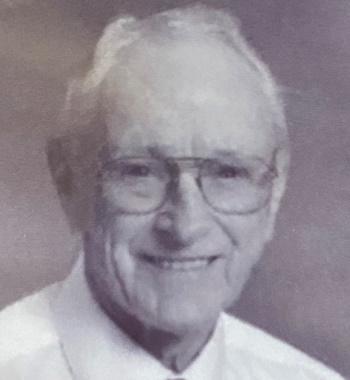 Dr. James CantrellInducting Institution: Bethel University Bethel University - B.S., Mathematics, Chemistry | 1953
After graduating Palmersville High School in rural Weakley County, Tennessee, James Cantrell entered Bethel College in September of 1949. A star athlete in high school, he continued playing basketball and baseball at Bethel. His basketball coach encouraged him to take a remedial math class. Little did he know that mathematics would be his life’s work. In his second year, Dr. Cantrell allowed a friend to talk him into enrolling in a course in trigonometry, taught by Martha Stobbe, Bethel’s gifted teacher of all things mathematical. He also came under the influence of Clara Dishman, who ran a tight ship at the dining hall but taught chemistry with patience and clarity. The Bethel experience introduced Dr. Cantrell to a new world of science, and he graduated in June of 1953 with a degree in Mathematics and a minor in Chemistry. He continued his post-graduate work by earning a master’s degree in mathematics from the University of Mississippi in 1955, followed by his PhD from the University of Tennessee in Knoxville. His interest in topology—the study of geometric properties and spatial relations unaffected by the continuous change of shape or size of figures—was sparked while a graduate student at UTK. In 1961, his doctoral thesis came to the attention of the American Mathematical Society, which reserved a section in its bulletin for quick announcements of mathematical results of “very special interest.” Dr. Cantrell’s research was groundbreaking. After earning his doctorate, Dr. Cantrell joined the faculty of the University of Georgia, where he continued his work in the field of topology. In 1966, he became a fellow of the Sloan Foundation in recognition of his outstanding work in the field. The foundation, launched by Alfred Sloan (a longtime president of General Motors), provided support to promising young scientists. Considered one of the highest honors a young scientist can receive, the fellowship provided Dr. Cantrell with two years of support for unfettered research. Dr. Cantrell’s findings have been widely published in American Mathematical Society publications. Besides being named a fellow of the Sloan Foundation, he was invited by Robert Oppenheimer to become a member of the Institute for Advanced Study and founded a yearly Georgia Topology Conference which, after 51 years, is one of the longest-running geometry conferences in the world. Dr. Cantrell retired in 1993 and was named Professor Emeritus and head of the Department of Mathematics at the University of Georgia. Endowed in his honor, the Cantrell Lecture Series continues to present lectures on topics of historical and research interest. In 2012, Dr. Cantrell was inducted into the Fellows of the American Mathematical Society based on his “distinguished contributions to mathematics.” Close
 Sherrie ClaiborneInducting Institution: Lincoln Memorial University Lincoln Memorial University - B.A., English and Sociology | 1969
Sherrie Nevils Claiborne has been involved with Lincoln Memorial University since Kindergarten and her support continues today as the alumni representative to the Board of Trustees. Claiborne is a lifelong educator. She spent the first half of her career in public school classrooms. She dedicated the second half of her career to educating adults. She and a colleague developed a national award winning program that includes a Mobile GED Testing Center, serving more than 1,000 students each year. Her work led to the creation of the Adult High School Diploma Program that is now in all Tennessee counties and is used as a model in other states. The adult education program received the National Secretary Award for Outstanding Service. Throughout her 20 years of service in adult education, Claiborne served as the president of Tennessee Association of Adult and Continuing Education (TAACE), president of Commission on Adult Basic Education (COABE), and president of the National Coalition for Literacy (NCL). While serving as a member of the National Commission on Adult Literacy, Claiborne and others published Reach Higher, America Overcoming Crisis in the US Workforce. In addition to serving on the Board of Trustees, Claiborne is an active member of the Lincoln Memorial University Women of Service (WOS) organization. WOS is a community of impassioned, determined women committed to supporting each other’s pursuit of excellence while significantly impacting individuals in their quest for education. Claiborne has been instrumental in helping WOS establish an endowed scholarship, five food pantries, and a clothes closet for LMU students. Her vision and leadership to make her alma mater and her community the best they can be is extraordinary. Close
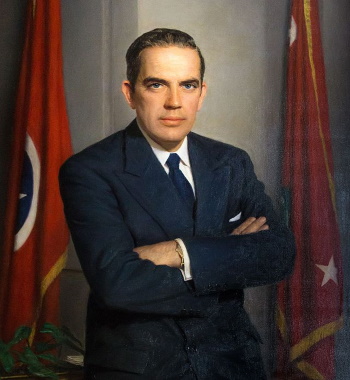 Governor Frank G. ClementInducting Institution: Cumberland University Cumberland University - Attended 1937-1939
Frank G. Clement was born on June 2, 1920 in the hotel his family owned and operated in Dickson, Tennessee. Raised with modest resources, his parents put an emphasis on education. At 16 years old, Clement told his friends, “I’m going to be governor of Tennessee,” and he worked tirelessly until he accomplished his goal. He became interested in public speaking at the suggestion of his aunt, who embraced her role as Clement’s speech teacher. Her recommendation changed his life. At 22 years old, Clement served as a Federal Bureau of Investigation (FBI) agent before joining the U.S. Army. He served our country from 1943-1946 and again from 1951-1952. Clement grew into one of the most effective orators in the country. His speaking ability, passion for politics and helping people of all races, religions, or creeds, got him elected governor at just 32 years old. He was the second-youngest man ever to hold the job in Tennessee. The 1953 convention changed the term of office from two years to four years with no succession permitted. Clement was reelected in 1954 by one of the most sweeping victories in Tennessee history and served until 1959. In 1954, as the state’s first chief executive elected to a four-year term, Clement simultaneously sponsored social service legislation and presided over the state’s transformation from an agricultural-based to an industrial-based economy, as well as the expansion of employment opportunities that accompanied the change. On a national level, Governor Clement, who was renowned as an orator, was chosen to deliver the keynote address at the 1956 Democratic National Convention in Chicago, Illinois. He chaired the Southern Governors’ Association (1955-1956) and served as a member of the National Governors Association Executive Committee (1955-1956, 1963-1964). In 1955, he became the first southern governor in U.S. History to veto a segregation bill. In 1956, he integrated the first southern high school (Clinton High in Anderson County, TN). He was the first U.S. governor to use the National Guard to protect members of the Civil Rights Movement and the first southern governor to actively and publicly support the movement. He ran for governor again in 1962 and won, serving another four-year term from 1963-1967. Under Clement’s leadership, Tennessee saw rapid change. Clement oversaw creation of the interstate system through Tennessee, allocated money for free textbooks in every public school, created the southern community college system, created the state’s first Department of Mental Health, attempted to abolish the death penalty, appointed the first woman to a governor’s cabinet, appointed the first African American to the Tennessee courts since Reconstruction, and he oversaw integration. Close
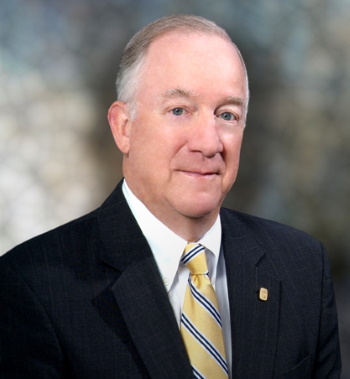 Dr. William CochranInducting Institution: Southern College of Optometry Southern College of Optometry - O.D., B.S. | 1968
Southern College of Optometry applies five core values in executing its mission to educate future optometrists and provide patients with the best care possible. These are: caring, excellence, integrity, respect, and service. SCO alumnus Dr. William Cochran was named president of the school in 1984, and during his tenure, he pushed the school forward to not only practice these values but also encourage other higher education institutions to adopt them. As a third generation optometrist, Dr. Cochran is deeply connected to the Southern College of Optometry. In fact, his parents met studying optometry at SCO in the 1940s. His mother was only the third woman to graduate from SCO. After Dr. Cochran graduated from SCO in 1968, he served his country as a captain in the U.S. Army’s Medical Service Corps and was stationed at Martin Army Hospital in Columbus, Georgia. After completing his military service, he practiced 13 years in a private primary care optometry partnership in Kosciusko, Mississippi. Dr. Cochran became the president of SCO in 1984 and began implementing changes to move the college into the national arena of optometric education. By his second decade as president, he had improved and stabilized the college’s finances. This strengthened the college’s ability to meet the educational, clinical, and technological needs of the students. By the late 1990s, the college had outgrown its clinical facilities, and Dr. Cochran launched a capital campaign to construct The Eye Center at SCO, a freestanding clinic in Memphis that was designed as a long-term teaching and patient care facility. The 55,000-square-foot clinic opened in 2002. Now in its 20th year, The Eye Center remains one of the largest public-teaching eyecare facilities of its kind in the U.S. Dr. Cochran retired in 2007 after 24 years of service as SCO’s president. Throughout his career, Dr. Cochran served in several top leadership roles within optometry-focused organizations. While in his private practice, he was active in the Mississippi Optometric Association (MOA) and served a term as its Legislative Committee chairman from 1972-74. He spent three years on the MOA’s board before becoming the association’s president in 1978-79. In 2021, Dr. Cochran wrote and published “Optometry in Mississippi: 1920-2020,” a book about the history of the optometry profession in Mississippi. The book commemorates the 100-year anniversary of when optometry was legislated as a profession in the state and reflects the history that has shaped optometry. Dr. Cochran was actively involved in several community organizations. This includes serving on the Board of Directors of the Tennessee Independent Colleges and Universities Association from 2001-04. Dr. Cochran served two six-year terms on the Board of Baptist Health Sciences University, including service as Chair, and now serves as a Board member Emeriti. Close
 David CoffeyInducting Institution: King University King University - B.A., Physics | 1955
King University’s mission is to produce the highest quality graduates, well-rounded in the liberal arts and who have a passion for serving God, the Church, and the world. David Coffey embodies the characteristics of an exemplary citizen who for years has given unselfishly of his time, his talent, and resources in support of King University and the community at large. Over the years, Coffey accrued a long list of awards and honors, beginning in 1965 when he was recognized as the Oak Ridge Young Man of the Year and the Tennessee Young Man of the Year. In 1991, he was honored as the Coopers and Lybrand Entrepreneur of the year. In 1986, Coffey was elected to the Tennessee General Assembly, where he served as a representative from 1986 to 1996. His fellow representatives chose him as the House Republican Floor Leader from 1989-1990. In 1996, Coffey was honored by the House of Representatives of the Ninety-Ninth General Assembly of the State of Tennessee for his meritorious service and commitment to public service. He has gone above and beyond, not only exhibiting a peerless work ethic and entrepreneurial vitality in business but also an altruistic disposition, paying forward for the greater good. Throughout his life, he has built a reputation as an esteemed professional, dependable friend, and committed family man who upholds the highest principles of public service. Upon graduating from King in 1955, Coffey entered the University of Tennessee at Knoxville to pursue an advanced degree. He then entered the business world and for the next fifty-plus years, he made an incredible impact on numerous organizations as an entrepreneur. These include being the Founder and Chairman of Nucleus, Inc. (1968-1991); Founder, Board Member, and Treasurer of Second Federal Savings & Loan Association (1974-1982); Founder and Vice President of CMC Construction Company, Inc., (1978-1989); Founder, Secretary, and a Board Member of SunGraphics, Inc., (1979-1986); Founder and Chairman of the Board of Cryomagnetics, Inc., (1983-1997); and as a Board Member of numerous organizations including Tennelec GMBH, Germany, (1979-1989); Atom Sciences, Inc., (1981-1986); Home Federal Bank of Tennessee, (1982-1991); Link Scientific Group, UK, (1989-1990); and X-Ray Technologies, Inc., (1989-1991). Always a supporter of post-secondary education, Coffey was a champion for securing state funding for the Roane State Community College campus in his Oak Ridge district. The first building on the campus was constructed in the late 1990s and is named the Coffey-McNally Building. Coffey’s philanthropy and overall support of King University through the annual fund for scholarships and programs, the general endowment fund, the Chemistry department, and campaign, and through the support of other human services has impacted hundreds, if not thousands, of students who have gone on to do their part in changing the world for the better. Close
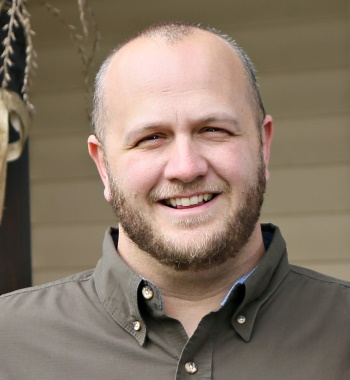 Adam DaleInducting Institution: Lee University Lee University - B.A., Political Science | 2005
Adam Dale is an extraordinary example of Christian scholarship, service, and vocation. He is a civil servant who is also a servant leader. On a daily basis, Dale tremendously impacts others for the good, in both his professional and personal life. After his graduation with a B.A. in Political Science from Lee University in 2005, Dale earned his J.D. from the University of Dayton Law School. His career trajectory has since soared. From 2008-2010, Dale served as a Judicial Advisor/ Attorney for the 7th Circuit Court. In 2010, he became an Attorney Advisor at the St. Louis National Hearing Center for the Social Security Administration. In 2014, he opened his own law practice, specializing in Social Security Disability Law. In 2020, Dale was selected as a Chief Federal Judge for the Social Security and Disability Administration, where six other judges report to him. Dale is also the youngest judge to ever be selected to sit on the Administrative Law bench. Dale has served his community throughout his professional career. He mentors attorneys as a writing coach. He supports his local K-12 school community by serving as an In-School Conflict Mediator for the Public School Conflict Resolution Team and coaches the middle school football team. He is also a Foster Parent Support group leader in two counties in the State of Michigan. Close
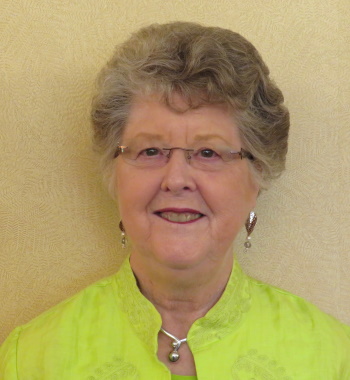 Dr. Judith Kofroth DomerInducting Institution: Tusculum University Tusculum College - B.A. | 1961
Dr. Judith Kofroth Domer’s career has supported and championed active and experiential learning. Her service has demonstrated a commitment to civic engagement. While a first-generation college student at Tusculum University, Dr. Domer was a founding member of Alpha Chi National Honor Society as well as a Charles Oliver Gray Scholar. Throughout her career, Dr. Domer performed a great deal of research, but she also mentored postdoctoral fellows and graduate students who did research in her laboratory. She taught both medical and graduate students in the areas of medical mycology and immunology. She was awarded a Ph.D. from Tulane University, where she served on the faculty for a number of years, eventually receiving the title of Professor of Microbiology and Immunology, Associate Dean of the Graduate School for Tulane University, and Acting Vice Chancellor for Graduate Studies at the university’s medical center. She completed her career as the Dean of Graduate Studies and Research at Appalachian State University. Dr. Domer received appointments to various study sections at the National Institute of Health, at the Veterans Administration and as a reviewer for Howard Hughes Predoctoral Fellowships. She has served as president of the Medical Mycological Society of the Americas. Additionally, Dr. Domer has served on the editorial boards of several journals, most notably “Infection and Immunity” and “Clinical Microbiology Reviews.” She also chaired the Annual Meeting Program Committee for the American Society for Microbiology, and was awarded the Founders Distinguished Service Award by the Society in 2001. Throughout her career, Dr. Domer’s research was published in 68 peer-reviewed journals. As past president of the Alumni Executive Board and as a trustee, she has been an active promoter and enabler of Tusculum University’s mission. Dr. Domer’s philanthropy and influence has touched countless lives. In 2015, she and her husband, Dr. Floyd Domer, established 2 endowments at Tusculum University, one for scholarships and the other for research. The scholarship endowment is fully funded, while the research endowment will be funded as part of a $1 million bequest to Tusculum University. In 2013, the Domers also established the Floyd R. and Judith E. Domer Scholarship Fund for the University of Iowa College of Pharmacy, Floyd’s alma mater. In 2015, the couple established a $1 million bequest that enhanced the scholarship fund and created the Floyd R. and Judith E. Domer Lectureship Fund. Close
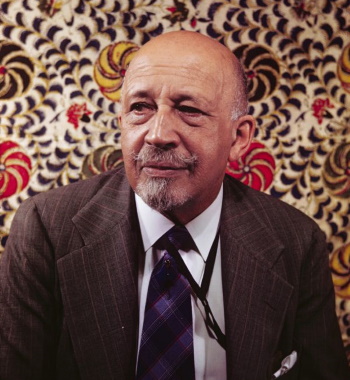 Dr. William Edward Burghardt Du BoisInducting Institution: Fisk University Fisk University - A.B. | 1888
William Edward Burghardt Du Bois was born in Barrington, Massachusetts on February 23, 1868. After graduating from high school with top grades at the age of 17, Du Bois, who wanted to attend Harvard but was unable to obtain a scholarship, entered Fisk as a sophomore. He said, “I was thrilled to be for the first time among so many people of my own color or rather of such various and such extraordinary colors which I have only glimpsed before, but who it seemed were bound to me by new and exciting and eternal ties.” He contributed to several campus publications and served as editor of the student literary publication, The Herald. As a student, he led a group of demonstrating students to barricade themselves in Jubilee Hall to support a cause. Du Bois used his Fisk education to have one of America’s most distinguished careers in social thought and action. He became an educator, author, historian, sociologist, philosopher, poet, leader, and apostle of peace. He was one of the most gifted intellectuals of the twentieth century. He was a founder of the National Association for the Advancement of Colored People (NAACP), a pioneering Pan-Africanist, a vigorous promoter for world peace and a champion for civil rights in the Jim Crow era. During his lifetime, he founded five publications: The Moon (1905); Horizon (1907-1910); Crises (1910-1934); The Brownies Book (1921-1922); and Phylon (1940-1944). His experience at Fisk is said to have altered his soul and illuminated his identity. In his autobiography, Dusk of Dawn, Du Bois recalled that his three years at Fisk “were years of growth and development.” He voiced how his “knowledge of the race problem became more definite.” His Fisk experience heightened his consciousness of himself as a Black man and the destination of all Black people. Among his works are The Souls of Black Folk, which covered his opposition to Booker T. Washington’s accommodation philosophy; The Philadelphia Negro: A Social Study (1899); Atlanta University Studies (1897); and Dusk of Dawn, his autobiography. Du Bois published more than 19 books, hundreds of essays, reviews, articles, and journals. His writings spanned a period of more than 75 years. His subjects were representative of his vast knowledge and scholarship, which included poetry, critiques, stories, sociological research, short stories, political editorials, history, and novels. He also delivered thousands of lectures and speeches throughout the United States and many other countries. His life and works continue to be the focus of dissertations, books, and other works. Du Bois died August 27, 1963 in Ghana, where he was buried, following a state funeral in Accra. He was eulogized by Martin Luther King, Jr. on August 28, 1963, as the March on Washington began. At the same event, NAACP Executive Director Roy Wilkins announced that Du Bois had died the previous day and told the thousands gathered that, “His (Du Bois’) was the voice that was calling you to gather here today in this cause.” The fruits of the civil rights movement, subsequent gains, and those that will occur in the future are considered the fruits of the seeds planted by Du Bois. Du Bois was the Founder and General Secretary of the Niagara Movement, which later evolved into the National Association for the Advancement of Colored People (NAACP). From 1910-1932, he served as editor of the NAACP’s periodical, Crises, and was a leader in the modern movement for full equality for African Americans. In 1992, the U.S. Postal Service issued the Du Bois commemorative stamp, which became the 15th in the Black Heritage series. Close
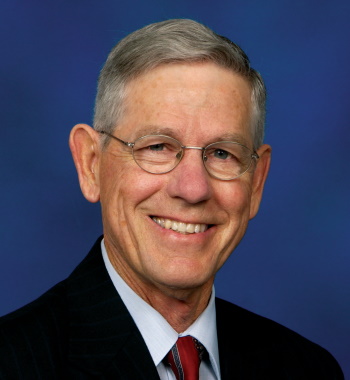 Dr. David EubanksInducting Institution: Johnson University Johnson Bible College - B.A. | 1957
David L. Eubanks has embodied the Johnson core values and the mission of Johnson University through continued sacrificial service since 1958 as professor, president, and president emeritus. Dr. Eubanks served as president of Johnson University for 38 years, one of the longest tenures of any college or university president in the country. Dr. Eubanks enrolled at Johnson in 1953 and never left. After earning his master’s degree, he joined the faculty in 1958. In 1968, at the age of 34, Dr. Eubanks was named Johnson’s fifth president – one of the youngest college or university presidents in the country. Until he retired, Dr. Eubanks and his wife Margaret lived on campus their entire adult lives, including 51 years of their marriage. During his tenure, Dr. Eubanks transformed Johnson University from a small, rural Bible college into a regionally accredited institution with four times the number of undergraduate students and seven times the number of faculty and staff. He led the construction process for a number of new buildings, including both men’s and women’s dormitories, the Phillips-Welshimer multipurpose building, the Eubanks Activities Center, the Global Education Technology Center, and the Gally Dining Hall. He also achieved approval for the elementary teacher education program by the Tennessee State Board of Education. Under Dr. Eubanks’ leadership, the total student body grew from 235 in 1969 to 876 in 2006. This included record enrollments in 15 of those years. Dr. Eubanks led the school through eight highly successful capital campaigns during his presidency and built a significant endowment that focused on the establishment of permanent scholarship funds. When Johnson acquired Florida Christian College (FCC) in 2014, Dr. Eubanks moved his family to Kissimmee, Florida for two years where he served as Chief Operations Officer to help lead the transition and to build relationships with the FCC faculty and staff, local church leaders, and donors. He continues to serve as President Emeritus at Johnson University and remains active in fundraising and public relations. Close
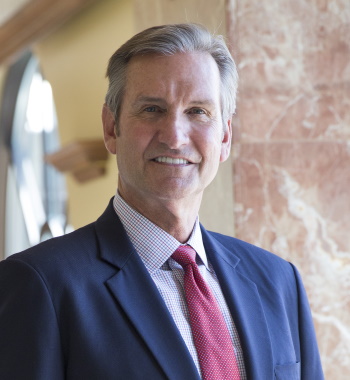 Dr. Stephen FlattInducting Institution: Lipscomb University Lipscomb University - B.A. | 1977
Dr. Stephen F. Flatt has embodied the values of Lipscomb University throughout his career. The current CEO of National Healthcare Corporation (NHC) and former Lipscomb University president lives out the mission of creating a Christcentered community to prepare learners for purposeful lives through rigorous academics and transformative experiences. During Dr. Flatt’s tenure as Lipscomb University’s 16th president from 1997 to 2005, he focused on clearing the pathway to a Christian education for as many students as possible. This was displayed by his establishment of many new academic programs: Bachelor of Science in Nursing, a School of Engineering, Master of Divinity, and Master of Business Administration. Through these new programs, there was an opportunity for more students than ever before to study in a Christian environment, preparing them to impact the world around them. As Board Chairman of the Tennessee Independent Colleges and Universities Association, Dr. Flatt led the charge for all private and independent colleges to be included in the HOPE Scholarship Program. Dr. Flatt also oversaw the construction and completion of Allen Arena, among other facilities, and Lipscomb’s move into the NCAA Division I. Both of these processes ultimately built a strong foundation for Lipscomb’s continued growth and opportunity for transformative experiences outside of the classroom. In addition to his work in Christian higher education, he served as pulpit minister of Madison Church of Christ, from 1986-1997. Because of Dr. Flatt’s leadership, Lipscomb continues to assist every student, regardless of their age, grow the light of Jesus in their hearts and to help them maximize their God-given gifts to fulfill the good works that God prepared in advance for them to do. Dr. Flatt joined NHC in 2005 as Senior Vice President of Development, and was promoted to the role of NHC’s President in 2009. He became CEO on January 1, 2017. Dr. Flatt also serves on the Executive Committee of the Council for the Post Acute Care, the Board of Directors of The Community Foundation of Middle Tennessee, and the Board of Directors of the Nashville Inner City ministry. He is a member of the Nashville Health Care Council and was named one of Middle Tennessee’s “Health-Care Heroes” by the Nashville Business Journal. Close
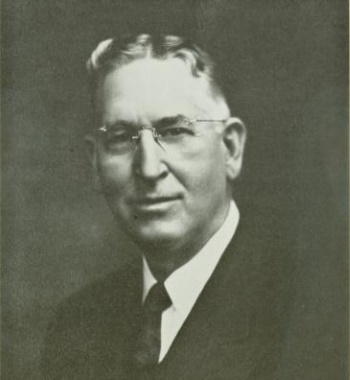 Nicholas Brody (N.B.) HardemanInducting Institution: Freed-Hardeman University West Tennessee Christian College* - B.A. | 1895
Known as one of the greatest preachers of all time in the Churches of Christ, Freed-Hardeman University exists today because of West Tennessee native N.B. Hardeman. His dreams, ideals, and sacrifices brought the university into being, and those same principals guide it today. During Hardeman’s almost 60 years as an administrator and teacher, it is estimated more than 20,000 students sat at Hardeman’s feet to learn about the Bible and various other subjects. He also had an immeasurable influence on the state of Tennessee and the southeast. He was the catalyst for the location of the first highway in Henderson, which opened West Tennessee to easier travel, trade, prosperity, and literally put Freed-Hardeman on the map. Hardeman attended two schools in Henderson, Tennessee, that were predecessors to what is now Freed-Hardeman University. He became a professor while still a student and later served as Vice President and President. In addition, he served as the minister of the Henderson Church of Christ and Superintendent of the Chester County School District. When lack of funding caused Georgie Robertson Christian College in Henderson to cease operations, local business owners approached Hardeman and A.G. Freed to begin a new institution of higher learning. Hardeman, along with Freed, purchased property with their own money and raised the funds necessary to build the school. They opened the National Teachers Normal & Business College in 1908. In 1919, NTN&BC was purchased from Hardeman and Freed and renamed Freed-Hardeman College in honor of the founders. After first serving as Vice President of Freed- Hardeman, Hardeman became President of the university in 1925 and served in that role until 1950. His leadership and vision deeply influenced generations of students and set the course for the success that Freed-Hardeman University enjoys today. Because of his skills as a gifted preacher, Hardeman was featured in a series of five lectures at the Ryman Auditorium in Nashville, called the Hardeman Tabernacle Sermons. The sermons were broadcast on radio and published in many regional and national newspapers in 1922, 1923, 1928, 1938, and 1942. Attendance ranged from six to eight thousand people, with as many as three thousand turned away because of lack of space. Throughout his life, Hardeman developed an interest in the Tennessee Walking Horse. He owned, rode, and trained several horses and was active in the National Tennessee Walking Horse Celebration in Shelbyville. He was a judge during the 1939 celebration and continued to participate during the 1940s as a rider and an owner. One of his horses, Maid of Cotton, won a Tennessee Walking Horse championship. On May 18, 1959, friends and family held a surprise 85th birthday party for Hardeman at the Peabody Hotel in downtown Memphis. Among the dignitaries in attendance were Governor of Tennessee, Buford Ellington; Senator Albert Gore; Senator Estes Kefauver; and family friend, the United States Senate Majority Leader and future U.S. President Lyndon B. Johnson. Close
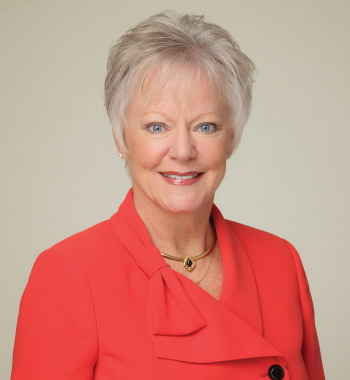 Beverly JordanInducting Institution: Baptist Health Sciences University Baptist Memorial Hospital School of Nursing - Diploma in Nursing | 1977
Beverly Jordan showcases the Baptist Health Sciences University mission of preparing graduates for careers of service and leadership by providing a comprehensive health sciences education within an integrated environment of learning and Christian principles. She was recruited as the ideal student who shares a commitment to Christian values and ethics, academic excellence, and lifelong professional development. Jordan graduated with her Nursing diploma from Baptist Memorial Hospital School of Nursing (now Baptist Health Sciences University) and stayed with Baptist throughout her career. She started as a bedside nurse and continued to learn, develop, and lead in all aspects of patient care, which led her to hold a number of leadership roles during her tenure. Some of those titles include Chief Nursing Officer of Baptist Memorial Hospital-Memphis and the Baptist system as well as Vice President and Chief Information and Transformation Officer for Baptist Memorial Health Care Corporation. Jason Little, current Baptist Memorial Health Care Corporation CEO, said it best when speaking of Jordan, “Many of our new leaders are ‘home grown’ and have worked their way up into their new roles.” Throughout her career as a healthcare provider, Jordan was an advocate for patients. She continuously challenged the norm and determined innovative tactics to advance quality of care and patient safety. Before her retirement in 2021, Jordan was able to help the Baptist system implement the electronic medical record initiative, Baptist OneCare, which earned Baptist a 2019 College of Healthcare Information Management Executives (CHiME) HealthCare’s Most Wired recognition as a certified level seven. Baptist was the only health care organization in the mid-south to earn the recognition. Jordan also led the implementation of MyChart, a secure portal that gives patients controlled access to the same health record their physicians and clinicians use. Jordan highlighted MyChart saying, “We cannot change health care as an industry. We have to change it on an individual level. I have to start caring about my own health, and MyChart allows me to do that.” Both of these successful initiatives, plus many others, resulted in Jordan being recognized by Health Data Management as one of the Most Powerful Women in Healthcare IT in 2018. While leading in the field of health informatics and technology, Jordan set aside time to volunteer for Habitat for Humanity, serving as the Baptist chair and vice chair for the homes with which Baptist was involved. She also served on the Board of Directors for Leadership Memphis and Baptist Health Sciences University. She provided health system perspectives to academic advisory boards and Deans of Nursing programs to help better equip the future of healthcare. Close
 Frank H. KnightInducting Institution: Milligan University Milligan University - B.S. | 1911
Raised in Illinois, Frank H. Knight began his college career at American University in Harriman, Tennessee, in 1907. Upon its closure in 1908, Knight transferred to what was then known as Milligan College, where he earned a bachelor’s degree in 1911. Knight was a lifelong academician, earning degrees from the University of Tennessee and Cornell University. Eventually, he would join the Economics Department at the University of Chicago, leading its transformation into one of the most influential economics departments in the world. Knight’s most important work was his 1921 book, Risk, Uncertainty, and Profit, in which he recognized the existence of uncertainty in economic decision-making when he distinguished it from risk, incorporating each into his articulation of the classical, free-market model. Knight believed it was the presence of uncertainty that brought about the possibility of profit, which he viewed as an essential outcome for increasing economic welfare. Further, he believed freely operating markets, unfettered by government influence, were necessary if economic decisions were to lead to the most optimal outcomes for society. The inherent conflict between decisions made in one’s self-interest versus those made for the betterment of society, especially in the presence of uncertainty, provided Knight with the basis for believing that economic decision-making had significant ethical implications. He spent much of his career addressing these issues. Knight was a significant influence on the development of what became known as the Chicago School of Economics, an institution known for its advocacy of free-markets and limited government intervention in economic affairs. Among his students were four recipients of the Nobel Prize in Economics, including Milton Friedman, James Buchanan, and George Stigler, all of whom had profound influence upon American economic policy, especially in the latter half of the twentieth-century. Close
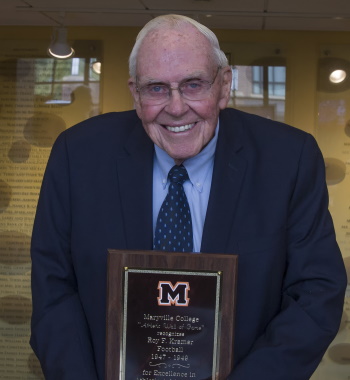 Roy KramerInducting Institution: Maryville College Maryville College - B.S., Health and Physical Education | 1951
Roy Kramer started as the waterboy for the Maryville College football team and worked his way up to one of football’s most powerful positions: SEC Commissioner. Kramer played high school and college football in Maryville. His time at Maryville College was interrupted by military service, but Kramer graduated in 1951. From there, he went on to the University of Michigan, where he earned his master’s degree in education in 1954. Kramer began his football coaching career at the high school level in Michigan. In 1965, he accepted a position as the freshman coach at Central Michigan University. Two years later, he became the head coach. Kramer guided Central Michigan University to a national championship in 1974. He was named “Coach of the Year” and was recognized by the Detroit chapter of the National Football Foundation and Hall of Fame. In 1978, Kramer received a phone call that would lead him and his wife back to Tennessee. Vanderbilt University wanted him to be the new athletic director. During his tenure, Kramer orchestrated the renovation of the McGugin Center and piloted construction of Vanderbilt Stadium. Kramer’s work at Vanderbilt caught the attention of the Southeastern Conference. He assumed the role of SEC Commissioner in 1990. Under Kramer’s leadership, the conference saw exponential growth and even some controversy. In his first year as commissioner, the conference added South Carolina and Arkansas. It was Kramer who thought there had to be a better way to determine college football’s national champion. As a result, the Bowl Championship Series (BCS) as we know it today was born. Depending on the season, controversy over the top two teams could be fierce but the impact of the new BCS system couldn’t be questioned. It raised college football to the national level and made it “must see TV.” During Kramer’s time with the SEC, the conference won 81 national championships. Kramer negotiated multi-sport national television packages. Because of his influence, the Men’s and Women’s SEC Athlete of the Year Award is presented annually as the Roy F. Kramer Award. Close
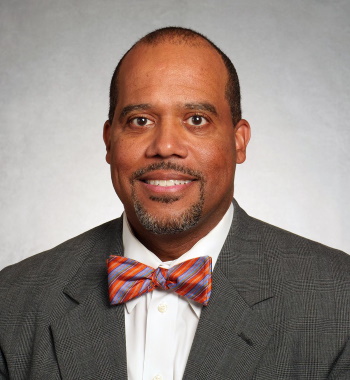 Dr. Ryan MireInducting Institution: Rhodes College Rhodes College - B.S., Biology | 1993
A native of New Orleans, Dr. Ryan Mire left the “Big Easy” for Memphis, where he attended Rhodes College. His experience at Rhodes formed the foundation for a life and career dedicated to caring for others. While at Rhodes, Dr. Mire garnered an internship at Le Bonheur Children’s Hospital. He said the experience provided impactful, real-world exposure to the medical field and cemented his interest in medicine. Dr. Mire received his medical degree from the University of Tennessee, Memphis College of Medicine. He completed his internship and residency in internal medicine at the Medical College of Virginia/Virginia Commonwealth University, where he also served as Chief Resident. After completing his residency, Dr. Mire made Nashville his home. He is a private practice internal medicine physician. He is the current president of the American College of Physicians (ACP). Dr. Mire also holds an academic appointment as Assistant Clinical Professor of Clinical Medical Education for the University of Tennessee Health Science Center. He has held leadership roles in medicine for Heritage Medical Associates and Ascension St. Thomas West hospital. Dr. Mire has served on the ACP Board of Regents since 2017. He chaired ACP’s Medical Practice and Quality Committee for two consecutive years and served on other committees during his Regent term. Dr. Mire was also the national Chair of the ACP Council of Young Physicians. Additionally, he received the Laureate Award for the Tennessee chapter of the ACP. Dr. Mire has been a Fellow of the American College of Physicians (FACP) since 2006. FACP is an honorary designation that recognizes professional accomplishments, demonstrated scholarship, ongoing individual service, and contributions to the practice of internal medicine. Dr. Mire is a life member of Alpha Omega Alpha Medical Honor Society and a member of the National Medical Association. He is a Diplomate of the American Board of Internal Medicine. Close
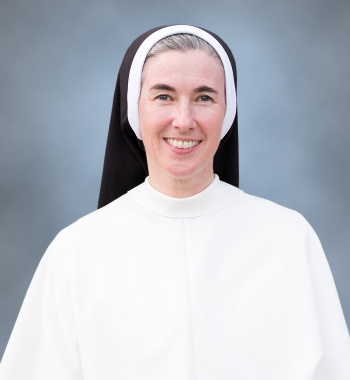 Mother Anna Grace Neenan, O.P.Inducting Institution: Aquinas College Aquinas College - B.A., Elementary Education | 2002
As Prioress General of the Dominican Sisters of St. Cecilia Congregation, Mother Anna Grace Neenan presently serves as Chair of the Board of Directors of Nashville’s Aquinas College. In exercising her responsibilities, Mother Anna Grace both embraces and exemplifies the unique educational mission of Aquinas College, doing so with enthusiasm and depth of insight. Mother Anna Grace entered the Dominican Sisters of Saint Cecilia in 1996. She earned her B.A. in Liberal Arts at Aquinas College in 2002, and an M.S. in Educational Leadership from Christian Brothers University in Memphis, Tennessee in 2007. In addition to her initial theological formation, she spent a year pursuing studies in spiritual theology at the University of Saint Thomas Aquinas in Rome, and is currently working towards an M.A. in Thomistic Studies at the Pontifical Faculty of the Immaculate Conception in Washington, D.C. For over 20 years, Mother Anna Grace has served her religious community of St. Cecilia in leadership roles, which have involved not only classroom teaching and school administration, but also responsibilities in the early formation of the young women in the community’s novitiate program. In each of these capacities, she has shown a spiritual depth and gentle wisdom clearly focused on the genuine good of the human person. She has brought this same focus to her responsibilities as Chair of the Aquinas College Board of Directors – whether the matter under consideration be academic excellence, curricular planning, questions of a financial nature, or spiritual formation of students. Mother Anna Grace assumed her responsibilities as Board Chair at a significant moment in the now 60-year history of Aquinas College, which is owned and operated by the Congregation of Saint Cecilia. She became Board Chair precisely as the College was implementing the decision to discontinue a number of its program offerings, in order to concentrate its efforts fully on the preparation of educators. Mother Anna Grace has led the Aquinas Board of Directors with vision and foresight, as together they have actively supported the College in this renewal and deepening of its founding mission. It is the kind of education, she often emphasizes, which prepares students not simply to be effective educators, but teachers whose personal lives of faith and love transform the culture in which they live. Mother Anna Grace consistently offers us an example of what we are about at Aquinas College, leading with a vision set on values that are eternal. Close
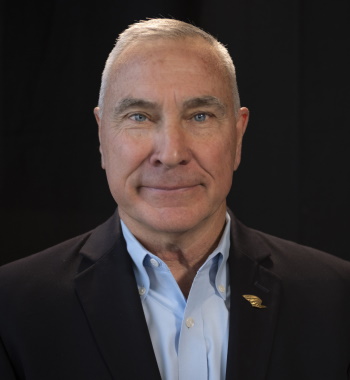 Major General Mastin RobesonInducting Institution: Bryan College Bryan College - B.S., Business Administration | 1976
Major General (Ret.) Mastin Robeson embodies a life lived in service to others reflecting the mission of Bryan College to educate students to become servants of Christ who will make a difference in the world. As a member of the United States Marine Corps, Robeson served his country with distinction and retired after 34 years of active service having achieved the rank of Major General. Following his military career, General Robeson has facilitated over a dozen for-profit and non-profit enterprises, including founding Upstate Warrior Solution, which seeks to serve and support the active and retired military community in the Upstate of South Carolina. A native of the Carolinas, Mastin Robeson was commissioned to the Marine Corps in 1975. In his 34-year military career, he served in more than 60 countries. He retired from the Marine Corps in February 2010. Major General Robeson served in combat zones in Liberia, Desert Storm, Somalia, Bosnia, Horn of Africa, Southern Philippines, Iraq and Afghanistan. He commanded at every operational level in the Marine Corps, including its Anti-Terrorism unit, an infantry battalion, an infantry regiment, a combined joint task force in combat, two Marine Expeditionary Brigades, two Marine Divisions, and the Marine Corps Forces Special Operations Command. He served as Military Assistant to Secretary of Defense William S. Cohen and as Directory of Strategy, Plans, and Assessments for General Dave Petraeus in Iraq, where he was responsible for writing and assessing the 2007 Crocker/Petraeus surge campaign plan. Robeson is an honor graduate of the Marine Corps Amphibious Warfare School and Command & Staff College, a graduate of Bryan College, and completed the Army’s Advanced Operational Arts Studies Fellowship. He also instructed at the Marine Corps Amphibious Warfare School and at the Army’s School of Advanced Military Studies. Since 2010, Robeson has been President and CEO of TRGSolutions, a consulting firm that has assisted more than 35 companies in business development, marketing strategy and planning, executive leadership and decision-making, and crisis management. Mastin currently serves as the Chairman of the Board of Upstate Warrior Solutions (non-profit assisting veterans and their families in the Upstate of South Carolina) and President of UASidekick (software company for drone flight coordination and approval). He also speaks on leadership and corporate culture transformation, and he continues to support studies and education efforts in Africa, the Middle East, and the Pacific Rim. Robeson previously served as President or CEO of 3 companies, on 10 boards of directors or advisors, as a senior advisor to 5 institutions, and on a college Board of Trustees. Robeson is married to his college sweetheart of 46 years and has four children and ten grandchildren. Close
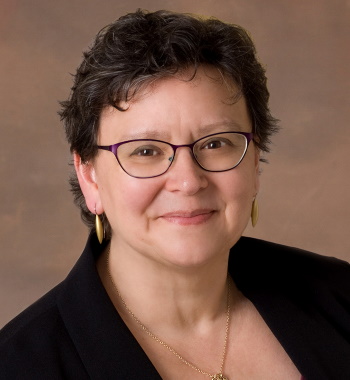 Dr. Beth RushingInducting Institution: Carson-Newman University Carson-Newman University - B.A., Sociology | 1981
Dr. Beth Rushing, a 1981 graduate of Carson-Newman, has dedicated her career to the pursuit and improvement of higher education. Rushing serves as president of the Appalachian College Association (ACA), a consortium of 33 private colleges and universities in Appalachia that offers collaborative opportunities and support for faculty, staff, and students at member institutions. As college eligible students hesitate to enroll and the overall student-age population drops, few areas are more in need of providing opportunities to quality higher education than Appalachia. Although a beautiful area officially touching 13 states that has produced multiple Pulitzer Prize and Grammy winners, Appalachia remains misunderstood. Even in 2022, this area produces a high percentage of first-generation college students. At Carson-Newman alone, 45% of students are first-generation. It is this work that Rushing has embraced in leading these 33 Appalachian institutions in a five-state heart of the region into a new area of attracting, supporting, and educating its students; a work for which she has served and studied since her time at Carson-Newman where she earned her baccalaureate degree in sociology. From there her interest in studying the development, structure, and functioning of human society led her to Duke University, where she earned her master’s and doctoral degrees in sociology. Her scholarly work has focused on the sociology of work, gender, and health. She served as president of the Southern Sociological Society and of Sociologists for Women in Society. She is a recipient of the Chancellor’s Leadership Award from the University of Washington Tacoma, Phi Kappa Phi Honor Professor at Georgia College, University Teaching Council Award from Kent State University, and Outstanding Faculty Member from Kent State’s Mortar Board, where she began her academic career in the Department of Sociology. Prior to her 2017 appointment as president of the ACA, Rushing served as chief academic officer at Guilford College, St. Mary’s College of Maryland, and the University of Washington Tacoma. She also served as dean of Arts and Sciences at Georgia College, and department chair at the University of Tennessee at Martin. Close
 Dr. Rondy SmithInducting Institution: Trevecca Nazarene University Trevecca Nazarene University - B.S., Communications and Human Relations | 1985
Education for leadership and service could be the tagline of her name. Dr. Rondy Smith has served as a professor, pastor, and now non-profit Executive Director, all with the purpose of helping others see the gifts they have to give to this world. She is a mentor, encourager, and catalyst for change. Dr. Rondy M. Smith is the founder and executive director of Rest Stop Ministries, Inc. Dr. Smith is an ordained elder in the Church of the Nazarene and served as Community Life Pastor of the Hermitage congregation from 2001-2015. Previously, she was Associate Professor of Management and directed the graduate degree program at Trevecca Nazarene University from 1991-2001. Dr. Smith began her career in the corporate sector, serving the Leadership Development Center at Northern Telecom, Inc. She was also a consultant with Executive Learning, Inc. and continued her consulting practice after joining the academic ranks as university faculty. As a professor and pastor, she has challenged people in her care to use their strengths for the good of others. She founded Rest Stop Ministries, Inc. comprehensively restoring female survivors of domestic sex trafficking. Rest Stop Ministries follows a housing-first model to provide holistic survivor-centered, trauma-informed care in a long-term residential community. Dr. Smith is committed to restoring the lives of women who would not have much of a chance otherwise. Her work and service lift up people and give them opportunities to thrive, when at some point their actual survival was in question. Close
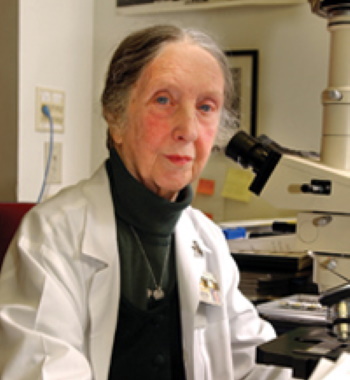 Dr. Mildred StahlmanInducting Institution: Vanderbilt University Vanderbilt University - B.A. | 1943
Dr. Mildred Stahlman’s pioneering research and caring spirit embody Vanderbilt University’s mission to educate leaders who impact our global society and our Vanderbilt values of daring to be bold in a community of radical collaboration. Mildred T. Stahlman, M.D. revolutionized the care of high-risk newborns by creating the world’s first modern neonatal intensive care unit (NICU) at Vanderbilt University Medical Center. Throughout a lifetime of indelible contributions to the field of medicine, Dr. Stahlman pioneered modern neonatal care across the United States and the world – revolutionizing the face of neonatal care in modern academic medical centers and, thus, changing the fate of countless newborns who would otherwise have had no future. An international expert on diseases of the newborn, Dr. Stahlman has spent her academic and professional career at Vanderbilt, creating the first modern neonatal intensive care unit in the country, initiating the Angel Transport mobile intensive care unit for newborns, developing overseas fellowship exchange programs, and continuing to research diverse methods to prevent and treat disease. Equally significant is her devotion to each Vanderbilt medical student and pediatric resident who has had the privilege of working under her demanding tutelage. Her belief in the power of education is illustrated through her quiet, generous philanthropy. Truly, her contributions to medicine, the field of ethics, and her community have transformed the world in which we live. A 1943 graduate of the Vanderbilt College of Arts and Science, Stahlman earned her medical degree from Vanderbilt in 1946. She served as an intern at Lakeside Hospital in Cleveland, as a pediatric intern at Children’s Hospital in Boston, as assistant resident on the pediatric service at Vanderbilt, as an exchange fellow at the Royal Caroline Institute in Stockholm, and as a cardiac resident at La Rabida Sanitarium in Chicago. She became an instructor in Pediatrics at Vanderbilt in 1951. Dr. Stahlman’s initial research was in pediatric cardiology, but in the late 1950s and early 1960s she moved in a direction that changed her life and the lives of thousands of premature babies and their parents. When a baby girl with severe hyaline membrane disease was born in October of 1961, Dr. Stahlman’s research was confronted with a life or death situation. The girl’s parents gave permission for a bold experiment at the time - helping their daughter breathe through the use of a respirator that had been scaled down for premature baby size. The ability to monitor the respirator’s effect on blood oxygen with umbilical catheters made respirator therapy possible. This interest in the respiratory problems of premature newborns, along with a National Institutes of Health grant, led Stahlman to put into place the first modern neonatal intensive care unit in the world. She was also involved in initiating the regionalization program of high-risk newborn care in Tennessee in 1973. She started Vanderbilt’s Neonatology Fellowship Training Program and has helped train more than 80 post-doctoral fellows from approximately 20 countries in research and high-risk newborn care. Close
 Rebecca Stevens-HummonInducting Institution: Sewanee: The University of the South The University of the South - B.A., Math | 1985
Becca Stevens is a speaker, social entrepreneur, author, priest, founder of 10 justice initiatives, and president of Thistle Farms. She has been featured on PBS NewsHour, the Today Show, CNN, and ABC World News. She has also been named a CNN Hero and a White House Champion of Change. Drawn from 25 years of leadership in mission-driven work, Stevens leads important conversations across the country with an inspiring message that love is the strongest force for change in the world. Stevens founded Thistle Farms in 1997 with a single home for survivors of trafficking and addiction. Twenty-five years later, it is a global movement for women’s freedom. Today, the Nashville flagship includes a residential program that serves as a national model for women’s recovery and three social enterprises that provide jobs to survivors — amounting to four million dollars in earned income last year. Stevens developed the Thistle National Network to provide tools, workshops, and conferences to support young organizations wanting to follow its holistic model of recovery. There are now 92 organizations, providing more than 500 beds to survivors, in the network. She also created Thistle Farms Global Shared Trade, which supports 1,400 artisan survivors in 20 countries. Additional enterprises Stevens has helped establish include the Center for Contemplative Justice and Larkspur Conservation in the U.S., as well as Escuela Ann Stevens and Sibimbe in Ecuador, Moringa Madres in Mexico, and Love Welcomes in Greece. Stevens attended the University of the South and Vanderbilt Divinity School, receiving alumni distinction awards from both. She has also been conferred multiple honorary doctorates. Stevens speaks to a broad range of non-profit, religious, and business audiences, often in bare feet to show solidarity with those she serves. Drawn from 25 years of leadership in mission-driven work, the courageous stories of women survivors, and wisdom from nature and healing traditions, Stevens inspires and motivates audiences everywhere with practical and loving steps to inspire change in individuals and communities. Her latest book Practically Divine released in September 2021 on Harper Horizon. Close
 Isaac "Ike" Burton TigrettInducting Institution: Union University Union University - B.S. | 1898
Mr. Isaac “Ike” Burton Tigrett was born in 1879 as the son of a Baptist preacher in Friendship, Tennessee. He graduated from Southwestern Baptist University (later named Union University) in 1898 after four years of academic study. During his time at Union, he excelled as captain of the baseball team, Washington Anniversary Speaker, class representative, and captain of the football team –– playing in the legendary game against Yale University. After several years in banking, Tigrett stepped in to serve as the “acting president” at his alma mater from 1909 to 1911. Union students recounted, “Under the administration of President I.B. Tigrett, the University has been particularly prosperous.” Under his leadership, Union operated within its income for the first time within several years. After leaving the presidency in 1911, Tigrett determined his greatest gift to the university would be through his finances –– and it was. He continued to financially support Union for years to come, even during the Great Depression. This was not the first time, nor the last, that Tigrett would put aside his plans and preferences to help those in need. Beyond the walls of Union, Tigrett took in his nephew, John Burton Tigrett, who had been placed in an orphanage after the boy’s father abandoned his family. Tigrett’s career in the railroad industry came about in an attempt to help a friend. His humility and wisdom served to uplift the city of Jackson, whether it was through industry, community, or the continued existence of Union University. His entrepreneurial skills saw Union through a rocky season and continued to allow young men and women to attend a university, where they would be educated and equipped to give back to the communities around them, just as I.B. Tigrett had done. Tigrett’s professional career began in 1899 at the Bank of Halls in Halls, Tennessee, which he founded with the $800 life insurance policy his father left him at his passing. He joked he was always surprised at his success in banking since it took him two days to balance his books after his first customer in Halls borrowed $50. In 1908, he was elected president of the Tennessee Bankers Association and the American Bankers Association. After Tigrett’s time at Union, a friend who had just purchased a 49-mile railroad line persuaded Tigrett to become the treasurer of the company. This small line would later become the Gulf, Mobile, and Ohio Railroad. As they endured the Great Depression, Tigrett knew this southern, and often overlooked, railroad might have a chance to survive if the operators could endear themselves to the rural towns on their routes. So, GM&O placed kindness as its mission to its passengers. Workers passed out seed packets to families along the route, assisted agriculture by bringing in specialists, and simply made these small, rural communities know they were of utmost importance to GM&O. After 32 years of service to the railroad industry, Tigrett’s presidency ended in 1952. At the time of his departure, he had taken a 49-mile piece of railroad and turned it into a 3,000 mile empire worth $175,000,000. Tigrett’s greatest legacy, however, would be left on the lives of those he impacted on a daily basis. He set the stage for a long line of entrepreneurs, paving the way for his nephew, John B. Tigrett, who would invent mesh-sided playpens and later be an influential force behind The Pyramid in Memphis, Tennessee. His great-nephew, Isaac B. Tigrett II, would later become the co-founder of Hard Rock Cafe. Choosing to remain in Jackson, Tigrett spent his days pouring into his community as a benefactor, encourager, and champion of the people and places he held so dear. There is no doubt countless lives were affected by the leadership and influence of I.B. Tigrett. Close
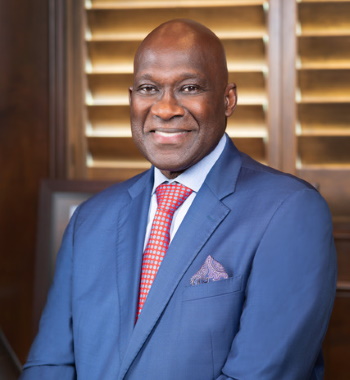 Jesse TysonInducting Institution: Lane College Lane College - B.S., Economics and Business | 1973
Jesse Tyson shares his story of being “a country boy” of the only male child of his grandmother’s offspring to graduate from college. He credits the experiences at Lane College for positioning him to visit more than 100 countries, hold private meetings with presidents, prime ministers, and ambassadors, and live in Belgium. Tyson is considered a global marketing and operations expert and has served in many positions within ExxonMobil with responsibilities for Europe, Asia, Latin America, Africa, and the USA. At Lane, Tyson developed the skills, adaptability, resilience, and persistence needed to transform his studies into a remarkable career and a purposeful, accomplished life. He credits Lane for opening the door that enabled him to pursue his dreams. He learned early that working in a multicultural and international environment is a key asset and an appealing advantage in leading organizations into the global marketplace. Tyson is an advocate for the underserved. He grew up as a sharecropper in the segregated South. He had limited access to educational opportunities. His grandmother, Lena Taylor, inspired him to pursue a life-changing education. However, when his grandfather passed away, Tyson’s plan for going away to college changed because he was the only male left at home. Tyson attended Lane in his hometown of Jackson, Tennessee, and notes it was a blessing. In 2002, in honor of his grandmother, Tyson established the Lena Taylor scholarship fund at Lane to provide educational opportunities for scholars from underserved communities. During his junior year at Lane, a professor encouraged Tyson to apply for an internship with the U.S. Department of Energy. He was accepted and worked four months in Washington D.C. and five months in West Africa. This was the turning point for Tyson. When he returned to Lane, Tyson had decided to further his education at the MBA program at The Ohio State University before working for ExxonMobil. Tyson’s dedication to Lane has never wavered. He regularly engages with Lane scholars. For many of them, meeting Jesse Tyson is a life-changing experience. Tyson served as an energy industry leader with a leveraged global knowledge of regulatory and environmental issues. He retired from ExxonMobil in 2011 with 35 years of service. Tyson’s strategic focus and bold foresight propelled him to lead the Global Aviation business for ExxonMobil based in Brussels, Belgium, working across multiple industry groups in developing strategic solutions around customer segmentation, operational excellence, and shareholder return requirements with clients in more than 50 countries and 500 locations across the globe. In this capacity, Tyson partnered with commercial/general/military aviation customers, airport authorities, IATA and JIG to identify new ways to enhance existing industry safety and efficiency efforts. Tyson served as the president and CEO of the National Black MBA Association. He is a current board member of several institutions: Ensemble Theater and Children’s Museum in Houston; the Dean’s Executive Advisory Board at Florida International University; the Board of Directors of The Foundation for Management Education in Central America; Florida A&M University; and the Advisory Board of the Fisher College of Business at The Ohio State University. He is a former member of the Board of Trustees at Lane College. He is also a member of the Orange Bowl Committee. Tyson is a member of several organizations, including Alpha Phi Alpha Fraternity Incorporated and Sigma Pi Phi. Dr. Tyson received an honorary doctorate from Lane College. He has attended The Brookings Institute and The International Management Development School in Switzerland. In addition, he served as an Economic intern with the U.S. State Department in Senegal. 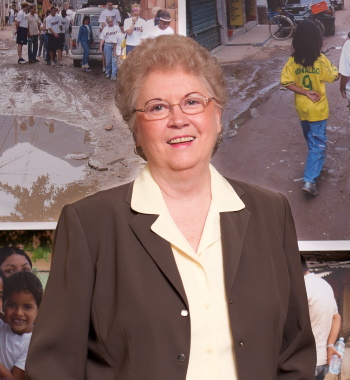 Close
 Betty WisemanInducting Institution: Belmont University Belmont University - B.A. | 1965
There may be no other person who so completely embodies the values of Belmont University than Betty Wiseman. She has been a legendary figure at the university for decades, and most recently has achieved more national recognition as “Belmont Betty“ after having been showcased alongside this year‘s women’s NCAA basketball tournament. Wiseman retired in May 2013 after spending 48 years at her alma mater, most recently as an Assistant Athletic Director and Senior Woman Administrator (SWA). During her tenure, she was a student, coach, professor, and administrator as well as an ambassador for the university. While at Belmont, Wiseman served as an associate professor of Health and Physical Education and in 2006 was named a professor emeritus in the Department of Health and Human Performance. She started the women’s basketball program at Belmont in 1968, one of the first women’s basketball programs in the southeast. She would serve as the team’s head coach for 16 seasons, compiling a 248-152 record and leading the Bruins to four consecutive berths in the National Women’s Invitational Tournament. In her work with Belmont Athletics as an administrator, Wiseman served as a liaison between the Department of Athletics and Student Affairs and served as an advisor to the Belmont Student-Athlete Advisory Committee (SAAC). She also worked with teams as they participated in service opportunities, including organizing and leading a yearly foreign mission trip to such places as Poland, Portugal, Brazil, and Italy. During the NCAA Women’s Final Four in 1999, Wiseman was given the Jostens-Berenson Lifetime Achievement Award by the Women’s Basketball Coaches Association (WBCA) in recognition of her professional lifelong commitment of service to the game of women’s basketball. Four years later, as the Curb Event Center opened, Belmont honored her by naming part of the university’s new athletic facility the Striplin-Wiseman Athletic Office Complex. Wiseman is a member of the Belmont Athletic Hall of Fame and the Tennessee Sports Hall of Fame. She was named a Tennessee Sports Legend by The Tennessean newspaper and was recognized as a pioneer by the OVC in the league’s celebration of the 40th anniversary of Title IX. Perhaps the most obvious recognition of Wiseman‘s representation of Belmont‘s values is the existence of the Betty Wiseman Missions Trip Endowment. In the summer of 1995, Wiseman led a group of nine people representing Belmont men’s and women’s basketball to the country of Poland. She pioneered an athletics mission movement at Belmont that has impacted people globally and continues to grow today. Betty Wiseman’s entire career has been characterized by service to others. Over the course of her nearly 50 years of service to Belmont, Betty has garnered numerous awards and accolades highlighting her contributions to the university and its community. |
10/27/2025 » 10/28/2025
Plant/Facilities Retreat
11/6/2025
Advancement Workshop